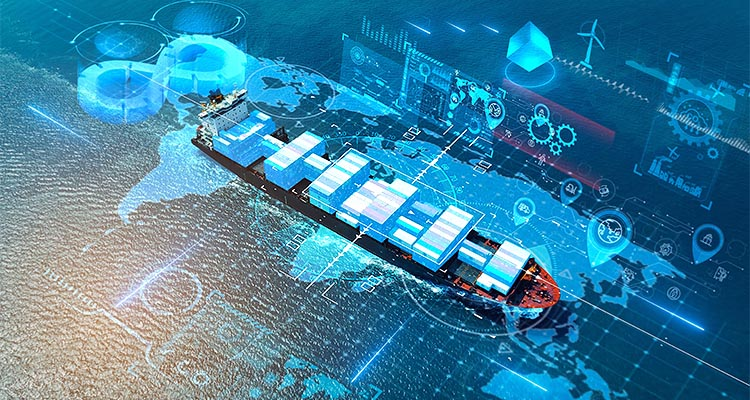Ensuring maritime resilience in an era of uncertainty
Global supply chains have always faced turbulence, but the stakes have risen with escalating geopolitical conflicts and unpredictable weather events. These developments heighten risks for ships, crew and cargo, necessitating increased awareness and rapid response capabilities from both ship masters and owners. Concurrently, the maritime industry faces an array of new challenges, including crew shortages, emissions management, and the transition to green shipping.
Despite these evolving threats, human error remains the greatest risk to vessels. Maritime operations are among the most perilous professions. The maritime industry now has access to an unprecedented wealth of data resources that improve tracking, security, route optimization, weather forecasting, charter party compliance, ship performance, and emissions management. Harnessing this data can transform vessel and crew safety. Digital systems not only enhance efficiency, but also enable highly effective preventative maintenance and alleviate administrative burdens for senior crew members.
However, the majority of safety incidents stem from failure to adhere to the rules, regulations and procedures, or from mistrusting or overriding information. The maritime industry must embrace cultural change and demonstrate the transformative power of data in improving crew safety and well-being. Captain Steve Bomgardner, Vice President Shipping & Offshore, Pole Star Global, advocates for leveraging digitization to enhance crew experiences at every level of onboard operations, embedding the value of information within the industry and overcoming the mistrust that can lead to catastrophic disasters.
Prioritizing safety
Shipping companies worldwide are increasingly recognizing the need to enhance their data resources and improve information utilization. The limitations of siloed,

legacy data systems and the risks to safety, efficiency and responsiveness created by a lack of trusted, real-time data are becoming apparent. Many major disasters and routine incidents could have been avoided with better, up to date data – such as the outdated weather information that led to the loss of the El Faro and its crew.
Under immense pressure to meet deadlines and port delays, crews may push boundaries without adequate oversight. Reluctance to reroute due to weather or conflict arises from potential delays and added costs. Rerouting can also further delay shore leave or extend contracts for a crew that has been at sea for up to 18 months, leading to underplayed risk assessments.
The depth of data available today informs efficiency and performance decisions and is crucial to creating safer working environments. For instance, speed and fuel consumption curves not only monitor engine efficiency but can also indicate improper fuel combustion. Timely information use can reduce risks of oil leak or hydrocarbon failures that could cause crew casualties and/or environmental disasters; and support preventative maintenance to avoid costly delays in dry dock while the problem is fixed.
Cultural transformation
However, simply collecting data alone does not safeguard vessels and crew. The Deepwater Horizon disaster exemplifies that data alone is insufficient; mistrust of data and human error led to the explosion, causing 11 deaths and the world’s most devastating oil spill.
Even with data, its value is often not recognized or understood by crews. Senior crew members spend more time in meetings, swamped by documentation, rather than engaging in hands-on activities. Many view onshore oversight of engine performance or fuel consumption as punitive rather than supportive. Consequently, data and systems are perceived as distractions rather than vital additions for supporting safety and efficiency.
To truly harness integrated information, crews need better ways to interpret multiple data feeds at once. They must understand how digitization and data support their daily activities and enhance core activities, rather than undermining them. Critically, a cultural shift is needed to recognize that providing onshore teams with an immediate and complete overview of onboard activities is an extremely important second line of defense against incidents and disasters.
Enhancing crew experience
Maximizing the value of available information requires changing attitudes towards data through better education and training and tools that genuinely improve day-to-day working experiences. Prioritizing vessel safety and crew well-being is crucial for changing attitudes towards digitization and data.
For example, no single person should have to decide whether a sensor is faulty, or if a reading is false. A unified perspective can transform onboard understanding of evolving risks. Improved systems can also reduce administrative burdens, such as automated digital permit-to-work systems, allowing senior crew members to focus more on sailing and hazard avoidance. This not only improves efficiency but also significantly boosts morale – a growing concern on board many vessels.
While data costs remain a challenge, the cost of high-speed internet at sea is prohibitive and many ship owners cannot justify investing in highly connected vessels equipped with sensors. In this context, hardware free voyage optimization systems can also provide a solution by delivering fleet monitoring, regulatory compliance, performance analytics and voyage optimization in a single view. Even without dedicated hardware, both onboard crew and onshore teams can gain the necessary insight to enhance safety and security.
Conclusion
Regardless of whether the next crisis for ship owners stems from war, severe weather or another global health emergency, one incontrovertible challenge remains: recruiting onboard crew is becoming increasingly difficult. The extended durations at sea, combined with limited shore leave, significantly impact crew morale. This profession is uniquely demanding, often oscillating between mundane and high-risk situations, with daily challenges ranging from illness and fires, groundings, or emergency responses.
To address these issues, ship owners and masters must leverage digitization and information systems to enhance decision making and responsiveness. However, achieving this requires a concentrated focus on crew safety and morale to cultivate trust in these technologies. When crew members understand that data has the potential to improve their day-to-day working experience – through effective preventative maintenance, better weather forecasting, and the automation of administrative tasks – their engagement and trust will naturally increase.
Reducing stress and bolstering morale are critical to improving crew performance. When morale is high, vessels operate more efficiently, and cargo is delivered on time and safely. Therefore, the use of data is imperative not only for safeguarding shipping operations but also for fostering a supportive and satisfying work environment for seafarers. By equipping crews with the information they need to handle challenges effectively, the maritime industry can ensure readiness and resilience in the face of the next crisis.
For a list of the sources used in this article, please contact the editor.
Pole Star Global develops pioneering maritime intelligence technologies to protect its customers’ vessels, people, reputation, and financial investments. Its solutions enable time-critical decisions and mitigate risk across all facets of maritime activity – from cross-border trade to sustainability risk, the monitoring of territorial waters, and everything in between.
